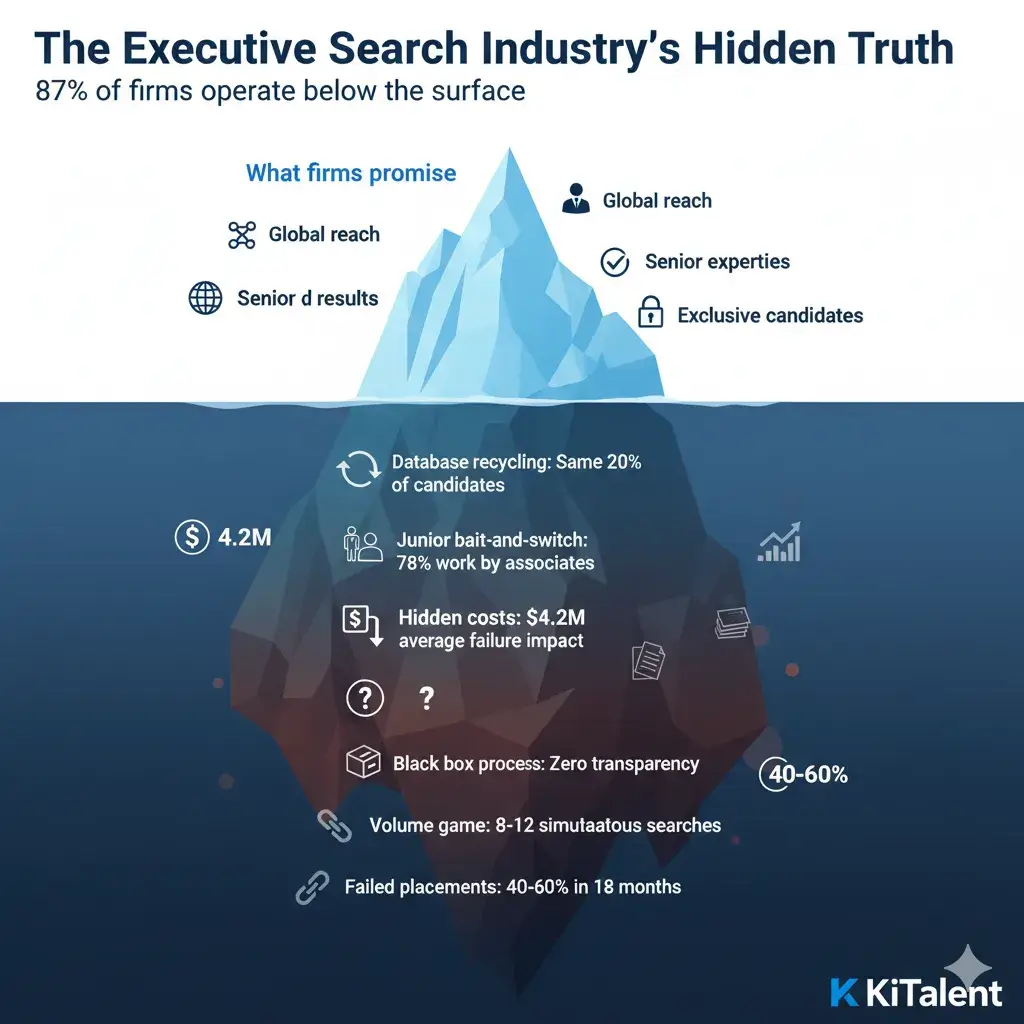How to Choose an Executive Recruiting Firm: What Separates Elite Search Partners from the Rest

In today’s hyper-competitive talent landscape, the difference between selecting the right executive recruiting firm and settling for a mediocre one can determine whether your organization thrives or merely survives. With CEO turnover rates reaching record highs and the cost of a bad executive hire potentially exceeding $2.7 million in opportunity costs, understanding how to evaluate and select a search partner has become mission-critical for boards and leadership teams worldwide.
Understanding the Executive Search Landscape
The executive recruiting industry has evolved dramatically over the past decade. While traditional search firms once dominated through relationships and personal networks, today’s leading firms leverage sophisticated technology, data-driven insights, and innovative engagement models to access the roughly 80% of exceptional leaders who aren’t actively looking for new opportunities.
At the top tier, global powerhouses handle C-suite searches for Fortune 500 companies. They offer extensive reach and brand recognition, but their services often come with lengthy timelines of three to six months and substantial upfront retainers that can exceed $150,000 before any candidates are presented. Below them, specialized boutique firms focus on specific industries or functional areas, often providing deeper sector expertise and more personalised service. As detailed in our methodology guide, specialized firms can combine industry depth with innovative approaches like parallel market mapping to deliver qualified candidates in days rather than months. At the third tier, contingency-based firms operate on a “no placement, no fee” basis, but typically focus on mid-level management rather than true executive positions, and their volume-driven model often results in misaligned placements.
The Cost of Choosing the Wrong Search Partner
Research from Harvard Business Review indicates that 50–70% of senior executives fail within their first 18 months. This staggering failure rate often stems not from the executives themselves, but from fundamental mismatches in the search process. The direct financial impact is substantial: severance packages of 6–12 months’ total compensation, repeated search fees of 25–35% of annual salary, interim leadership costs of $5,000–$10,000 per day, and legal and administrative expenses averaging $50,000–$100,000.
Beyond the measurable financial impact, failed executive placements create ripple effects throughout organizations — disrupted strategic initiatives, damaged team morale, lost market opportunities during vacancies, and weakened investor confidence. As explored in our analysis of the true cost of a bad executive hire, these hidden costs make the selection of the right search partner a strategic imperative rather than a procurement decision.
What Distinguishes Elite Executive Search Firms
Proactive Market Intelligence
Leading executive search firms maintain continuous market intelligence rather than starting from scratch with each engagement. Through parallel mapping methodologies, top firms have already identified potential candidates before clients even articulate their needs. Organizations that partner with firms offering real-time market intelligence can reduce time-to-hire significantly while improving candidate quality — precisely because the firm isn’t scrambling to build a long list from zero. Learn more about how talent mapping accelerates the search process.
Direct Engagement Expertise
The best search firms excel at engaging passive candidates through personalised, value-driven outreach. This requires a deep understanding of executive motivations beyond compensation, the ability to articulate compelling opportunity narratives, established trust and credibility within target talent communities, and sophisticated assessment of cultural fit alongside leadership style. Our guide to headhunting services details how elite firms leverage these capabilities to access hidden talent pools.
Transparent Process and Aligned Incentives
Traditional retained search models requiring substantial upfront payments create misaligned incentives — the firm is compensated regardless of outcome, which can reduce urgency. Progressive firms are pioneering engagement models that demonstrate confidence in their abilities. The interview-fee model, for example, eliminates large retainers in favour of payment upon value delivery — when qualified candidates are actually presented for interviews. This approach, detailed in our executive search services overview, fundamentally changes the risk dynamics and accountability of the search.
Sector-Specific Expertise
Generic search approaches consistently underperform in specialised industries. Elite firms maintain dedicated practices with consultants who possess technical literacy in relevant domains, understand regulatory and compliance requirements, have established networks within specific sectors, and bring knowledge of compensation benchmarks and market dynamics. Whether searching for technology leaders, financial services executives, or healthcare leadership, specialised expertise drives measurably superior outcomes.
A Framework for Evaluating Executive Recruiting Firms
Track Record and References
Start with verifiable outcomes. Look for firms with placement success rates above 90% offer acceptance, minimum 85% two-year retention for placed executives, direct client testimonials from organisations similar to yours, and positive feedback from candidates about their experience with the firm. A strong track record is the single most reliable predictor of future performance.
Search Methodology and Process
Evaluate how each firm approaches its work in practice. This means examining their research depth and market mapping capabilities, assessment protocols beyond traditional interviews, use of psychometric and behavioural evaluation tools, and post-placement integration support. The Society for Human Resource Management (SHRM) recommends detailed process evaluation as a primary selection criterion.
Global Reach with Local Expertise
For organisations with international scope, assess physical presence in key markets, cross-border search capabilities, understanding of cultural nuances in different regions, and immigration and relocation support expertise. These factors become particularly critical when building leadership teams across geographies. Learn more about international executive search best practices and considerations.
Technology and Innovation
Modern executive search firms leverage technology to enhance — not replace — human expertise. This includes AI-powered talent mapping and identification, digital assessment platforms, CRM systems for relationship management, and analytics for market intelligence and competitive benchmarking. As McKinsey & Company has noted, technology should augment rather than substitute for human judgment in executive assessment. The firms that get this balance right consistently outperform those that lean too heavily in either direction.
Red Flags When Selecting a Search Partner
Certain warning signs should give any organisation pause. Be wary of firms that guarantee specific timelines without first understanding your needs — quality searches require thorough discovery and calibration. Lack of specialised expertise in your industry is another concern, as generic approaches routinely fail in specialised sectors. An unwillingness to provide detailed references suggests the firm doesn’t have a track record it’s proud of. Pressure for large upfront retainers without clear deliverables often signals misaligned incentives. And limited post-placement support indicates the firm views its role as transactional rather than advisory.
The Future of Executive Search
According to the Association of Executive Search and Leadership Consultants (AESC), several trends are reshaping the industry. Diversity, equity, and inclusion imperatives are making diverse candidate slates standard, with specialised expertise in identifying underrepresented talent and bias mitigation through structured assessment processes. Skills-based hiring is increasingly overtaking traditional credential requirements, with greater focus on demonstrated capabilities, learning agility, and recognition of non-traditional career paths.
Succession planning integration is also transforming how leading firms operate. As detailed in our talent pipeline development guide, the best firms now offer continuous talent relationship management, proactive pipeline development for critical roles, and internal talent assessment consulting. Combined with data-driven decision making — including predictive analytics for candidate success probability and market intelligence informing compensation strategies — these capabilities are raising the bar for what organisations should expect from their search partners.
Essential Questions to Ask Before Engaging a Search Firm
Before committing to any executive search firm, ensure you have clear answers across three critical areas. On process and methodology, ask how they identify and engage passive candidates, what assessment methods they employ beyond interviews, how they ensure cultural fit alongside technical competence, and what their typical search timeline and key milestones look like.
On team and expertise, understand who will lead your search and what their relevant experience is, what sector-specific expertise the team possesses, how they maintain market intelligence in your industry, and what their consultant-to-search ratio is — a proxy for how much attention your engagement will actually receive.
On commercial terms and alignment, clarify the fee structure and payment schedule, what guarantees they provide for placed candidates, how they handle confidential or sensitive searches, and what ongoing support they provide post-placement through structured onboarding and integration.
Maximising ROI from Your Executive Search Investment
The most successful executive searches result from true partnerships between organisations and their chosen search firms. Based on analysis of hundreds of successful placements, four principles consistently emerge. First, invest in thorough briefing and discovery — dedicate adequate time for stakeholder alignment so the firm understands not just the role specification, but the organisational context and cultural dynamics. Second, maintain active engagement throughout the process with regular communication with your search consultant. Third, leverage the firm’s market intelligence for organisational benchmarking, not just candidate identification. Fourth, support successful integration through structured onboarding that goes well beyond day one.
Research from MIT Sloan Management Review shows that structured onboarding can improve new executive performance by up to 30% and reduce time to full productivity by 50%. The search firm’s role shouldn’t end at placement — the best partners remain engaged through the critical first 100 days and beyond.
Conclusion: Making the Right Choice
Choosing an executive recruiting firm represents one of the most consequential decisions affecting your organisation’s future success. The right partner doesn’t just fill positions — they become strategic advisors who help build the leadership teams that define your competitive advantage.
As you evaluate firms for your next critical hire, remember that the lowest price rarely delivers the best value, the biggest brand doesn’t guarantee the best fit, and innovative approaches often outperform traditional methods. Whether you’re seeking C-suite leadership, building international teams, or requiring interim executives, the principles outlined in this guide will help you make an informed decision that delivers lasting value.
Ready to discuss how a strategic executive search partner can strengthen your leadership team?



